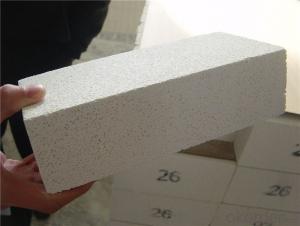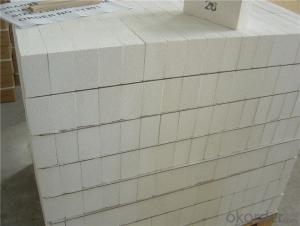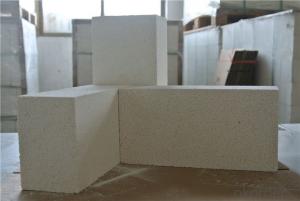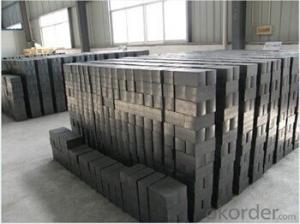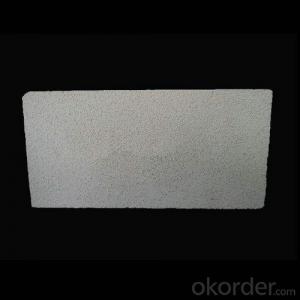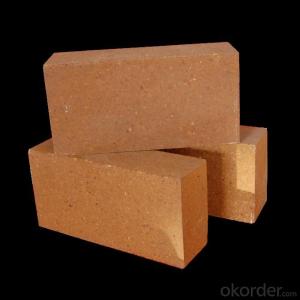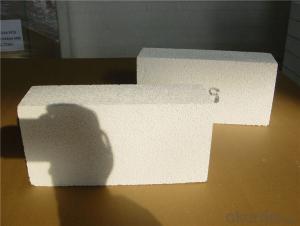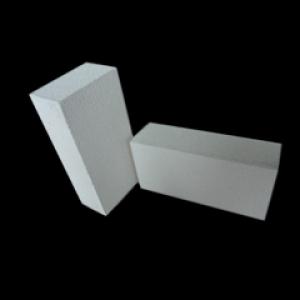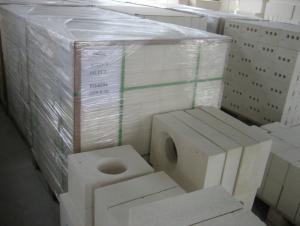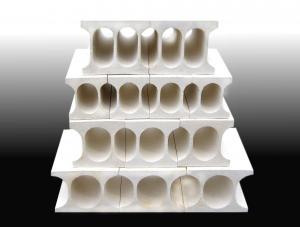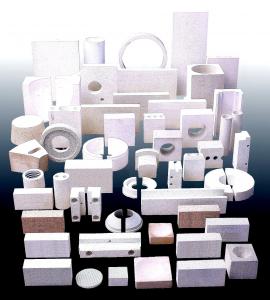Light weight fire clay insulating fire brick
- Loading Port:
- Tianjin
- Payment Terms:
- TT OR LC
- Min Order Qty:
- 30 m.t.
- Supply Capability:
- 10000 m.t./month
OKorder Service Pledge
OKorder Financial Service
You Might Also Like
CNBM conforms strictly to the requirements of ISO 9000 quality control system during the production. MSDS is also available if you want. The thermal insulation fire clay brick meet with the requirements of ASTM & JIS standards. So pls stay cool with our quality.
Insulating Fire Brick Technical index
Product No. | IFB70 | IFB60 | IFB50 | IFB40 |
Al2O3 | 68%-72% | 58%-62% | 48%-52% | 38%-40% |
Refractoriness (°C ) | ≥1790 | ≥1790 | ≥1790 | ≥1790 |
Bulk density (g/cm3) | 2.50-2.60 | 2.35-2.45 | 2.20-2.30 | 2.10-2.20 |
Apparent porosity (%) | 22 | 19-22 | 17-20 | 17-20 |
Cold Crushing strength (kg) | 480-510 | 450-480 | 430-450 | 390-430 |
Application
Insulating Fire Brick are used for the lining of converter, alternating current arc furnace, direct Current arc furnace and the ladle slag line, etc.
Equipment
1 unit of Ceramic Abrasive (SG Abrasive) pilot production line
2 units of Compact grain Abrasive pilot production lines
1 unit of high-end coated abrasives (abrasive cloth) production line
2 units of Boron Carbide production lines
3 large flexible crushing and sieving lines for grit production lines
2 units of 2000KVA furnaces for Boron Carbide fusion
6 units of 5000KVA-10000KVA dumping type electric arc furnaces for Brown Fused Alumina fusion
Company Advantage
(1)Long Insulating Fire Brick manufacture history: 25 years manufacturer
(2)Advanced equipment
(3)Diversification of production standards: ISO ANSI FEPA JIS ASTM
(4)Flexible payment: T/T L/C D/P D/A
(5)Professional marketing team and after-sale service
(6)Free sample
FAQs
Q1 |
What’s the transport method? |
A1 | FCL delivery goods with wooden pallet or wooden case by sea; If LCL delivery, must with wooden case; Sometimes need open top, flat rack or bulk cargo. |
Q2 |
What’s the required payment term? |
A2 | Generally 30% TT as the prepayment, 70% TT before delivery. If need, 100% Irrevocable Letter of Credit or negotiation. |
Q3 |
Which country are our products exported to? |
A3 | Apart from entire Chinese market, the US, Russia, Japan, Korea, Australia and some Southeast Asian Nations. |
- Q:Can insulating fire bricks be used in biomass power plants?
- Yes, insulating fire bricks can be used in biomass power plants. These bricks are designed to withstand high temperatures and provide excellent insulation, making them suitable for lining furnaces and boilers in biomass power plants. They help to increase energy efficiency by minimizing heat loss, ensuring optimal combustion, and reducing the overall energy consumption of the plant.
- Q:Are insulating fire bricks resistant to carbon dioxide?
- Insulating fire bricks, also known as refractory bricks, are designed to withstand high temperatures and are generally resistant to various chemicals and gases. However, their resistance to carbon dioxide may vary depending on the specific type and composition of the insulating fire brick. Carbon dioxide (CO2) is a non-flammable gas that is usually present in the atmosphere and is released during the combustion of carbon-based fuels. In most cases, insulating fire bricks have a high resistance to carbon dioxide due to their high melting point and the presence of refractory materials such as alumina and silica. However, prolonged exposure to high concentrations of carbon dioxide, especially at elevated temperatures, can cause some insulating fire bricks to undergo chemical reactions that may lead to degradation or reduced performance. It is important to consider the specific application and environment in which the insulating fire bricks will be used. If the insulating fire bricks are part of a furnace or kiln that generates significant amounts of carbon dioxide, it is advisable to choose bricks specifically designed for such conditions. These bricks may have additional protective coatings or higher chemical resistance to ensure their longevity and performance. In summary, while insulating fire bricks generally have good resistance to carbon dioxide, it is important to consider the specific type of brick and the conditions under which it will be used to ensure optimal performance and longevity.
- Q:Can insulating fire bricks be used in both residential and industrial applications?
- Insulating fire bricks are versatile and suitable for both residential and industrial use. They provide thermal insulation, preventing heat loss and maintaining desired temperatures in various settings. In residential applications, these bricks enhance energy efficiency and reduce heat loss in fireplaces, wood-burning stoves, and kilns. In industrial environments, they are commonly used in furnaces, kilns, and high-temperature areas to insulate and prevent heat transfer. Additionally, they are utilized in constructing ovens, chimneys, and boilers in both residential and industrial settings. In summary, insulating fire bricks can be applied in numerous applications, making them suitable for both residential and industrial purposes.
- Q:Are insulating fire bricks suitable for use in thermal power plants?
- Yes, insulating fire bricks are suitable for use in thermal power plants. These bricks are designed to withstand high temperatures and provide excellent insulation, making them ideal for use in areas where heat needs to be contained, such as furnaces, boilers, and other thermal power plant equipment. Additionally, insulating fire bricks are resistant to thermal shock, meaning they can withstand rapid temperature changes without cracking or breaking.
- Q:Can insulating fire bricks be used in the construction of boilers for power plants?
- Yes, insulating fire bricks can be used in the construction of boilers for power plants. Insulating fire bricks are specifically designed to have low thermal conductivity, which allows them to retain heat and prevent energy loss. This property makes them ideal for use in high-temperature applications such as power plant boilers, where efficient heat transfer is crucial for the production of steam and generation of electricity. Additionally, insulating fire bricks are lightweight and have good thermal shock resistance, making them suitable for the demanding conditions found in power plants. Overall, the use of insulating fire bricks in the construction of boilers can help improve energy efficiency and reduce heat loss, leading to increased operational performance and cost savings in power plants.
- Q:Can insulating fire bricks be used in high-temperature filters?
- Insulating fire bricks have the capability to be utilized in high-temperature filters. These bricks are specifically engineered to endure exceedingly high temperatures, typically reaching up to 3000°F (1650°C). They possess remarkable thermal insulation properties, low thermal conductivity, and high resistance to thermal shock, rendering them highly suitable for applications involving elevated temperatures. In the context of high-temperature filters, insulating fire bricks can be employed to construct the filter's framework, ensuring its endurance against the intense heat generated. These bricks can be arranged in such a manner that enables efficient filtration of gases or liquids while upholding their structural integrity under high temperatures. Additionally, the insulating properties of these bricks aid in minimizing heat loss and maximizing energy efficiency. Furthermore, insulating fire bricks often exhibit chemical inertness and possess commendable resistance to corrosive substances, thus making them appropriate for implementation in various industrial processes that entail the filtration of aggressive or hazardous materials at elevated temperatures. Overall, the utilization of insulating fire bricks in high-temperature filters offers a dependable and long-lasting solution for filtration applications that necessitate resistance to extreme temperatures.
- Q:Can insulating fire bricks be used in the construction of BBQ pits?
- Yes, insulating fire bricks can be used in the construction of BBQ pits. Insulating fire bricks are designed to withstand high temperatures and have excellent heat resistance properties, making them ideal for use in BBQ pits. These bricks help trap and distribute heat evenly, resulting in more efficient cooking and a better BBQ experience. Additionally, insulating fire bricks also help to reduce heat loss, ensuring that the BBQ pit retains and maintains heat for a longer period. Overall, using insulating fire bricks in the construction of BBQ pits can greatly enhance the performance and longevity of the pit.
- Q:Are insulating fire bricks suitable for insulation in steam boilers?
- Yes, insulating fire bricks are suitable for insulation in steam boilers. They are designed to withstand high temperatures and provide excellent thermal insulation, making them ideal for use in steam boilers to minimize heat loss and improve energy efficiency.
- Q:Can insulating fire bricks be used in tundish linings?
- Insulating fire bricks can indeed be utilized in tundish linings. Comprised of lightweight refractory materials, these bricks boast exceptional insulation properties. Given that tundish linings are typically subjected to elevated temperatures and thermal shocks, which can prompt swift deterioration, incorporating insulating fire bricks can effectively shield the tundish lining from excessive heat and thermal stresses. These bricks exhibit low thermal conductivity, thereby minimizing heat loss and maintaining a constant temperature within the tundish. Moreover, insulating fire bricks possess commendable mechanical strength, rendering them capable of enduring the mechanical stresses commonly encountered during tundish operations. In essence, the utilization of insulating fire bricks in tundish linings can enhance thermal efficiency, curtail energy consumption, and prolong the tundish's lifespan.
- Q:Are insulating fire bricks suitable for commercial or industrial applications?
- Yes, insulating fire bricks are suitable for commercial and industrial applications. They are commonly used in high-temperature environments such as furnaces, kilns, and ovens, where they provide excellent insulation and heat resistance. Their ability to withstand extreme temperatures and thermal shock makes them ideal for commercial and industrial settings where heat containment and energy efficiency are crucial.
1. Manufacturer Overview |
|
|---|---|
| Location | |
| Year Established | |
| Annual Output Value | |
| Main Markets | |
| Company Certifications | |
2. Manufacturer Certificates |
|
|---|---|
| a) Certification Name | |
| Range | |
| Reference | |
| Validity Period | |
3. Manufacturer Capability |
|
|---|---|
| a)Trade Capacity | |
| Nearest Port | |
| Export Percentage | |
| No.of Employees in Trade Department | |
| Language Spoken: | |
| b)Factory Information | |
| Factory Size: | |
| No. of Production Lines | |
| Contract Manufacturing | |
| Product Price Range | |
Send your message to us
Light weight fire clay insulating fire brick
- Loading Port:
- Tianjin
- Payment Terms:
- TT OR LC
- Min Order Qty:
- 30 m.t.
- Supply Capability:
- 10000 m.t./month
OKorder Service Pledge
OKorder Financial Service
Similar products
New products
Hot products
Related keywords
